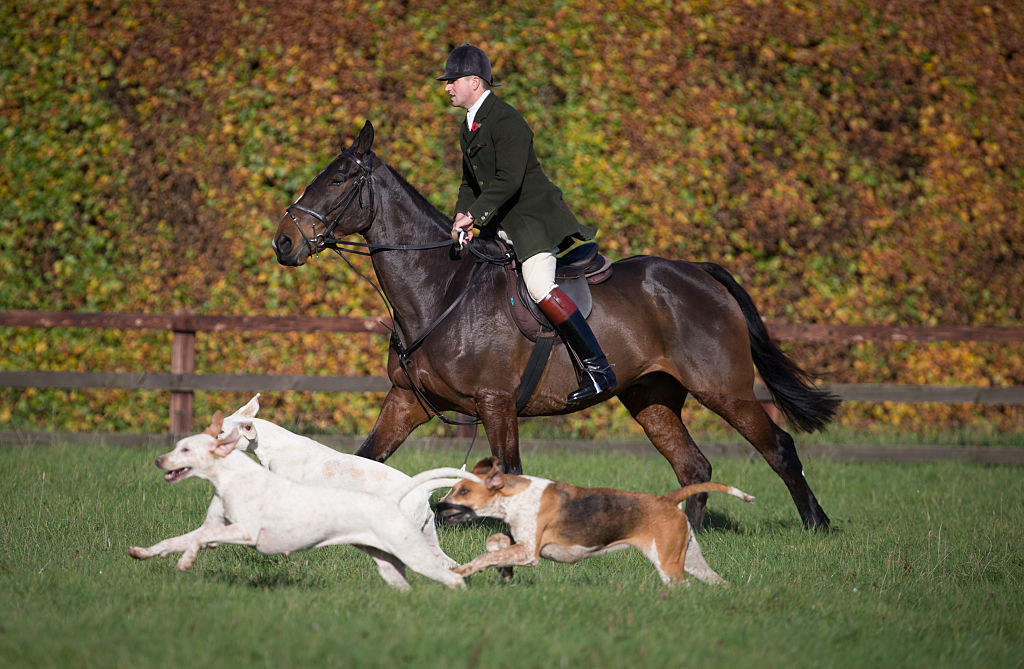Puppy shows cancelled. Point-to-points put on hold. Hound shows, team chases, skittles leagues, pony club camp – all have been axed from the countryside calendar. These are not announcements that tend to make headlines. What’s the cancellation of the Cattistock Countryside show when Glastonbury is grinding to a halt? Not that it’s a competition, but it’s a fact that rural areas get overlooked in times like these.
In response, countryside folk are taking matters into their own hands. In my own village in Dorset – a village not big enough to qualify for a postbox – Sylvia, an ex-schoolteacher, has decided it’s essential we have a community pop-up shop for emergency rations. At 66, I’m not sure Sylvia had ‘crisis aid’ at the top of her retirement plans, but needs must. That is the rural attitude: roll up the Tattersall shirt sleeves and just get through the crisis. And it’s an attitude strongly embraced by rural hunts.
Hunts have a history of rising to a crisis, read Siegfried Sassoon if you want a glimpse of the valiant endeavours of hunters and their horses in the Great War. During the foot and mouth outbreak, it was hunt staff who were called upon to assist with the management and quarantining of livestock.
Lord Mancroft, chairman of the Masters of the Foxhounds Association, is convinced of the hunt’s unique ability to aide rural people in these desperate times. ‘Hunting people are the ultimate survival community,’ he says. Hunts have this rare ability to mobilise their supporters. ‘That’s how we put 400,000 people onto the streets of London [to protest New Labour’s hunting ban in 2002]… we’re glued together by a passion for our hounds.’
It’s this and the hunt community’s fingers-in-many-pies makeup that enables it to act so effectively. Hunts are a cross-section of the community, from farmers to factory owners, schoolgirls to septuagenarians. They are a complex and interwoven collection of local people, who work hard together to achieve structure for their sport. Horses and hounds are bred and trained, tended and fed. Land is acquired. Fences are built. Lavish balls are held. Shoes fitted. Vets retained. Funds raised. The community works hard to maintain itself, and the environment on which it depends.
Matt Ramsden, master of the Duke of Beaufort’s Foxhounds, is a good example of this. He’s been using his time in isolation to lay hawthorn cover, a conservation practice used to promote biodiversity.
‘Let’s be clear,’ Ramsden warns me, ‘this virus is not good news for hunting.’
Hunts rely on the summer ‘silly’ season to bring in a huge portion of their funding. A hunt ball – which is for now, of course, an impossibility – can net 20 grand.
His fears are echoed by Will Bryer, master of the Cattistock Hunt. When we speak, he’s in a van loaded with dead animals from nearby farms. ‘Fallen stock collection’ is a vital service provided by hunts, salvaging the very best meat to feed to the hounds. It’s a ‘waste-not, want-not’ solution to the inevitable by-product of farming. Any spare gets rendered and used as tallow.
‘In the 1980s there was phenomenal trade for the skins of fallen stock,’ he tells me, ‘in recent years we’ve received a token amount, but, now the global skin market crashed because of coronavirus.’
Despite this, the Cattistock Hunt’s knacker van service will continue to run purely to provide necessary support to local farming communities.
The hunt will come to the aid to the people of west Dorset in other ways through the early stages of this pandemic. Country people have responsibilities: animals to care for, land to be worked, food to be produced, jobs to be protected. If a member of the community becomes ill, Will is confident he can muster a brigade of horse-poo pickers, dog walkers and meal cookers – whatever they need. Then there’s Megan, 19, who just landed her dream job on a racing yard in Ireland. When the virus struck, that wasn’t possible. Within a day Will found her an alternative local job.
Although the hunt is ready to organise shopping runs for the vulnerable, Will is keen to avoid just using supermarkets. Promoting small businesses is a priority. Hunts, because of their unique position nature in rural communities, have the network to promote local produce. From milk vending machines to fish smokers to local online companies like Harvest Bundles who connect consumers directly with farmers. ‘It’s about returning to how rural people always used to shop and stock up,’ he says.
Hunts are often mocked for their archaic ways; doing weird things that few of us understand. But, in these distressing times, we should be celebrating them, as they support overlooked rural people.
The final challenge the rural community faces is loneliness. Isolation was already a problem across the countryside before Covid-19, and now we face a long summer without the regular rituals of farmers’ markets, steam fairs, hedge laying competitions and working dog trials.
The hunt can offer more than just practical support in these troubled times. They can offer a form of spiritual support too. As spring progresses, foxhound packs will soon begin exercising. Nothing is quite as uplifting as the sight of 50 hounds lolloping through lanes.
Will tells me that the season for new hound puppies to be temporarily fostered has just begun. ‘Walking’, as the hunting fraternity call it, is the adoption of newly weened hound pups for three months by local families. So, while a puppy may not be just for Christmas, it could be just for the coronavirus lockdown.






Comments